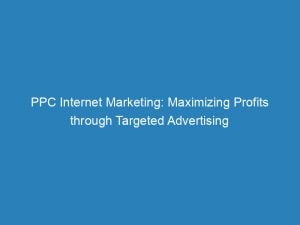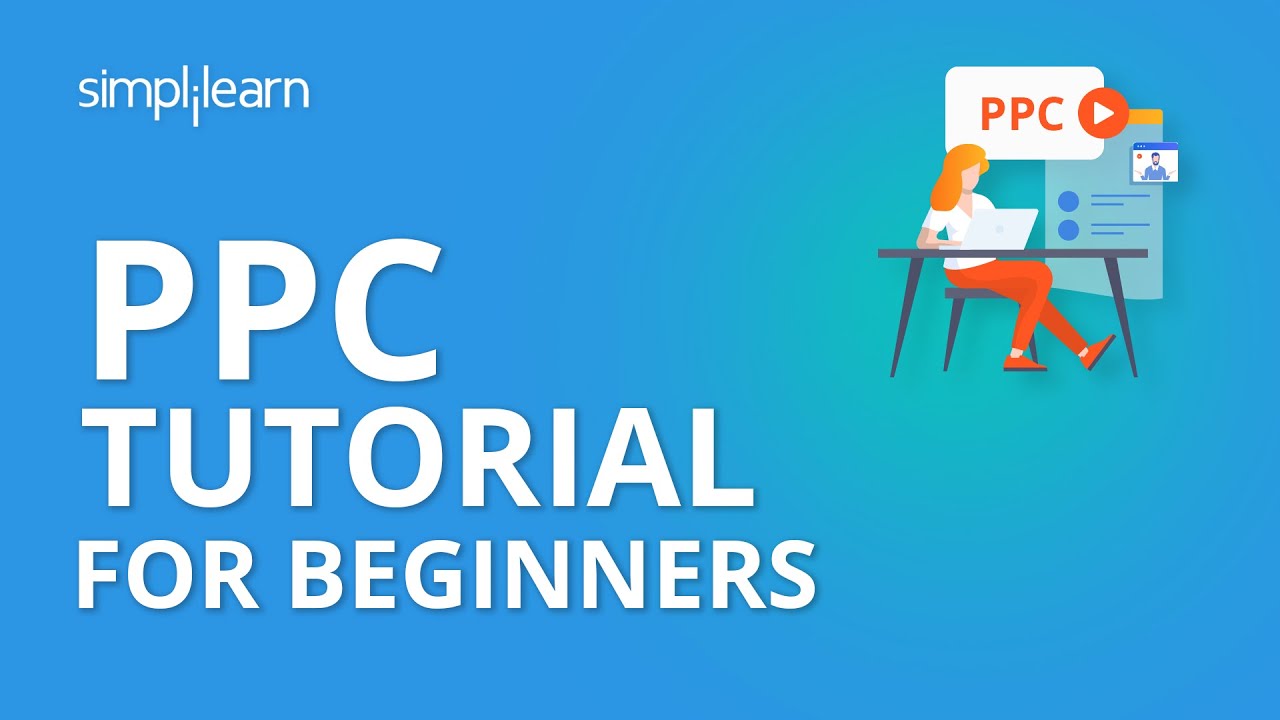- ppc internet marketing
- Overview Of PPC Internet Marketing And Small Business Advertising
- Understanding PPC: Paying For Search Engine Placement
- The Different Types Of PPC Advertising Platforms
- Benefits Of PPC: Cost-Effectiveness And Targeted Marketing
- SEO Vs PPC: Free Traffic Vs Paid Advertising
- Elements Of A Successful PPC Campaign
- Tracking Metrics And Maximizing ROI In PPC Advertising
In today’s digital landscape, where visibility and competition are fierce, small businesses are turning to online advertising to get a leg up in the market. With 45% of small businesses utilizing various platforms like Google Ads, Bing Ads, and Facebook Ads, the world of PPCinternetmarketing has become essential.
Offering cost-effectiveness, fast results, and the ability to target ideal customers, online advertising has revolutionized the way businesses reach their audience. However, it’s not all smooth sailing – keyword research, monitoring, and well-designed landing pages are crucial for success.
And that’s just the beginning. Continuous monitoring, adjustment, and tracking using metrics like clicks, CPC, CTR, impressions, and conversion rate are crucial for maximizing ROI and gaining an edge over the competition.
Buckle up and delve into the world of PPCinternet marketing, where strategy and data reign supreme.
| Item | Details |
|---|---|
| Topic | PPC Internet Marketing: Maximizing Profits through Targeted Advertising |
| Category | Ads |
| Key takeaway | In today's digital landscape, where visibility and competition are fierce, small businesses are turning to online advertising to get a leg up in the market. |
| Last updated | December 28, 2025 |
ppc-internet-marketing">ppc internetmarketing
PPC internet marketing, also known as pay-per-click internet marketing, is a form of advertising where businesses pay a fee to have their website displayed on search engine result pages (SERPs) when specific keywords are searched. It is a part of search engine marketing (SEM) that includes both paid advertising and search engine optimization.
The cost-per-click (CPC) determines the amount paid for each click on an ad, and the ad placement is determined by bids, with higher bids leading to better placement. Various platforms like Google Ads, Bing Ads, Facebook Ads, AdRoll, and RevContent offer different options for PPC advertising.
The benefits of PPC include cost-effectiveness, fast results, easy control and testing, and the ability to target specific customers. By combining PPC with SEO, businesses can achieve the best results in increasing website traffic and conversions, while continuously monitoring and adjusting campaigns to maximize return on investment (ROI).Key Points:
- PPC internet marketing involves paying a fee to have a website displayed on SERPs when certain keywords are searched.
- It is a part of SEM and includes both paid advertising and search engine optimization.
- The cost-per-click determines the amount paid for each click on an ad, and ad placement is determined by bids.
- Various platforms like Google Ads, Bing Ads, Facebook Ads, AdRoll, and RevContent offer options for PPC advertising.
- The benefits of PPC include cost-effectiveness, fast results, easy control and testing, and the ability to target specific customers.
- Combining PPC with SEO allows businesses to increase website traffic and conversions while optimizing campaign performance.
Sources
https://blog.hubspot.com/marketing/ppc
https://www.forbes.com/advisor/business/ppc-marketing-guide/
https://www.wordstream.com/ppc
https://ahrefs.com/blog/ppc-marketing/
Check this out:
💡 Pro Tips:
1. Use Negative Keywords: By including negative keywords in your PPC campaigns, you can specify search terms for which you don’t want your ads to appear. This helps to ensure that your ads are only shown to users who are likely to have genuine interest and avoids wasting your ad spend on irrelevant clicks.
2. Optimize Ad Copy: Writing compelling and relevant ad copy is essential for attracting clicks and improving your click-through rate (CTR). Experiment with different headlines and ad descriptions to see what resonates best with your target audience.
3. Utilize Ad Extensions: Take advantage of ad extensions offered by PPC platforms like Google Ads. Ad extensions can enhance your ads by providing additional information and encouraging users to take specific actions, such as making a call or filling out a form.
4. Test Different Bidding Strategies: Don’t stick to just one bidding strategy. Test different approaches like manual bidding, automated bidding, or even smart bidding to find the most effective strategy for your campaign. Monitor the results closely and make adjustments accordingly.
5. Leverage Remarketing: Implement remarketing campaigns to target users who have already interacted with your website. This allows you to stay top-of-mind with potential customers and increase the chances of conversions. Be strategic with your remarketing efforts by offering personalized ads and promotions to entice users to come back and complete a purchase.
Overview Of PPC Internet Marketing And Small Business Advertising
In today’s digital age, online advertising has become an essential marketing strategy for businesses of all sizes. According to recent studies, an impressive 45% of small businesses are engaging in some form of online advertising.
Among these, Pay-Per-Click (PPC) internet marketing has gained significant popularity.
PPC is a form of advertising where businesses pay a fee to have their websites displayed on the Search Engine Result Page (SERP) when specific keywords are searched. It is a cost-effective way to target potential customers and drive traffic to their websites.
With PPC, businesses can reach a broader audience and increase their online visibility.
Understanding PPC: Paying For Search Engine Placement
PPC falls under the umbrella of Search Engine Marketing (SEM), which encompasses any digital marketing efforts done on search engines. PPC is a means of paid advertising within SEM.
Businesses bid on keywords relevant to their products or services, and when someone searches for those keywords, their ads appear on the top or side of the search results.
The cost-per-click (CPC) refers to the amount businesses pay for each click on their ad. Ad placement is determined by bids, with higher bids leading to better placement on the SERP.
However, it’s essential to note that Google, the most popular search engine, also takes quality score into account when determining ad placement. The actual CPC is calculated using the formula (Competitor’s Ad Rank / Your Quality Score) + 0.01.
The Different Types Of PPC Advertising Platforms
When it comes to PPC advertising, several platforms dominate the market. The most prominent platform is Google Ads, which processes over 90,000 search queries every second.
Google Ads provides businesses with a wide range of targeting options, giving them access to a massive audience.
Bing Ads is another popular PPC platform that offers a slightly lower CPC compared to Google Ads. Although it has a smaller audience, Bing Ads enables businesses to tap into a different market segment.
For businesses looking to advertise on social media, Facebook Ads is an excellent option. Facebook Ads mainly functions on a Cost Per Thousand Impressions (CPM) model and allows businesses to target specific demographics and interests.
Other notable PPC platforms include AdRoll, which focuses on retargeting ads to people who have already visited a business’s website, and RevContent, which primarily promotes content through PPC.
Benefits Of PPC: Cost-Effectiveness And Targeted Marketing
PPC advertising offers numerous benefits for businesses. Firstly, it is a cost-effective marketing strategy as businesses only pay when their ads are clicked on.
This ensures that their advertising budget is used wisely, as they only pay for actual results.
Secondly, PPC campaigns produce fast results. Unlike Search Engine Optimization (SEO), which takes time to see significant improvements, PPC allows businesses to see immediate traffic and results.
This makes it an especially useful tool for launching new products or services.
Furthermore, PPC gives businesses control and testing options. They can choose their target audience, adjust bids, and test different ad formats.
This flexibility enables businesses to refine their marketing campaigns and optimize their results.
Lastly, PPC allows businesses to target their ideal customers. With the ability to select specific keywords, demographics, and interests, businesses can reach the right audience at the right time.
This targeted marketing approach ensures that their ads are displayed to individuals who are more likely to convert into customers.
SEO Vs PPC: Free Traffic Vs Paid Advertising
While PPC focuses on paying for advertisements to gain clicks, Search Engine Optimization (SEO) focuses on optimizing a website to gain organic traffic from search engines. Both strategies have their advantages and play vital roles in a comprehensive digital marketing campaign.
SEO is centered around improving website rankings in organic search results. It involves optimizing various on-page and off-page elements of a website to make it more search engine friendly.
The goal is to increase a website’s visibility without having to pay for each visitor.
On the other hand, PPC ads can produce fast results and provide businesses with easy control and testing options. They are particularly effective for short-term or targeted marketing campaigns.
The two strategies work in synergy, and combining SEO and PPC has been proven to yield the best results. By leveraging the data obtained from PPC campaigns, businesses can optimize their SEO strategies and improve their organic search rankings.
Elements Of A Successful PPC Campaign
A successful PPC campaign requires careful planning and execution. Several essential elements contribute to the success of a PPC campaign:
Well-researched and targeted keywords: Proper keyword research and selection are crucial for driving relevant traffic to a website.
High-quality landing pages: An attractive and well-designed landing page is essential for converting visitors into leads or customers.
It should be optimized for conversion and provide a seamless user experience.
- Ad creation and testing: Creating compelling and relevant ads is crucial for attracting clicks.
Testing different ad formats, headlines, and call-to-action buttons can help optimize the campaign’s performance.
- Monitoring and optimization: PPC campaigns should be continuously monitored and adjusted to maximize results.
Regular analysis of campaign metrics, such as click-through rates (CTR) and conversion rates, allows businesses to make data-driven decisions.
Tracking Metrics And Maximizing ROI In PPC Advertising
To ensure the success and cost-effectiveness of a PPC campaign, tracking relevant metrics is crucial. By closely monitoring key metrics, businesses can make informed decisions and maximize their Return on Investment (ROI).
Some essential metrics to track include:
Data refreshed to reflect latest ad-spend trends.
Clicks: The number of times an ad is clicked on. – CPC: The cost-per-click, which is the amount paid for each click on an ad.
CTR: The click-through rate, calculated by dividing the number of clicks by the number of impressions. – Impressions: The total number of times an ad is displayed.
Conversion Rate: The percentage of visitors who perform a desired action, such as making a purchase or filling out a form.
By optimizing ad spend through factors like Quality Score and monitoring metrics closely, businesses can maximize their ROI and achieve their advertising goals.
In conclusion, PPC internet marketing has become an integral part of small business advertising. With its cost-effectiveness, fast results, and targeted marketing capabilities, PPC provides businesses with a powerful tool to increase website traffic and conversions.
By combining PPC with SEO and implementing essential elements, tracking metrics, and continuously monitoring campaigns, businesses can maximize the benefits of PPC and achieve their advertising goals.











